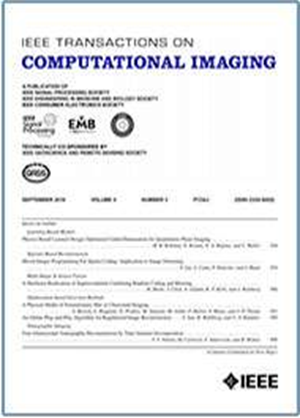Learning Light Field Denoising With Symmetrical Refocusing Strategy
IF 4.2
2区 计算机科学
Q2 ENGINEERING, ELECTRICAL & ELECTRONIC
引用次数: 0
Abstract
Due to hardware restrictions, Light Field (LF) images are often captured with heavy noise, which seriously obstructs the subsequent LF applications. In this paper, we propose a novel symmetrical refocusing strategy to construct the focal stack for every view in LF images and design a simple learning-based framework for LF denoising. Specifically, we first select views that are symmetrically arranged around a target view in LF images. Then we shift and average the selected views to calculate the focal stack, in which all refocused images are aligned with the target view and the noises are effectively suppressed. Then, a Fusion Network is designed to fuse the sharp regions in the focal stack to obtain the denoised target view with sharp details. We further exploit more angular and spatial detail information in LF images and combine the fusion outputs to obtain the final denoised LF images. We evaluate our method in various noise levels and kinds of noisy LF images with different disparity ranges. The experiments show that our method achieves the highest quality in both qualitative and quantitative evaluation than state-of-the-art methods. The proposed symmetrical refocusing strategy is also verified to highly improve the denoising performances.利用对称重聚焦策略学习光场去噪
由于硬件的限制,捕获的光场图像往往带有较重的噪声,严重阻碍了后续的光场应用。在本文中,我们提出了一种新的对称重聚焦策略来构建LF图像中每个视图的焦点堆栈,并设计了一个简单的基于学习的LF去噪框架。具体来说,我们首先选择在LF图像中围绕目标视图对称排列的视图。然后对选择的视图进行移位和平均计算,计算焦点叠加,使所有重聚焦图像与目标视图对齐,有效地抑制了噪声。然后,设计融合网络对焦点叠加中的尖锐区域进行融合,得到带有尖锐细节的去噪目标视图;我们进一步挖掘LF图像中更多的角度和空间细节信息,并结合融合输出得到最终去噪的LF图像。在不同噪声水平和不同视差范围的低频噪声图像中对该方法进行了评价。实验表明,我们的方法在定性和定量评价方面都比目前最先进的方法达到了最高的质量。实验还验证了所提出的对称重聚焦策略能显著提高图像的去噪性能。
本文章由计算机程序翻译,如有差异,请以英文原文为准。
求助全文
约1分钟内获得全文
求助全文
来源期刊

IEEE Transactions on Computational Imaging
Mathematics-Computational Mathematics
CiteScore
8.20
自引率
7.40%
发文量
59
期刊介绍:
The IEEE Transactions on Computational Imaging will publish articles where computation plays an integral role in the image formation process. Papers will cover all areas of computational imaging ranging from fundamental theoretical methods to the latest innovative computational imaging system designs. Topics of interest will include advanced algorithms and mathematical techniques, model-based data inversion, methods for image and signal recovery from sparse and incomplete data, techniques for non-traditional sensing of image data, methods for dynamic information acquisition and extraction from imaging sensors, software and hardware for efficient computation in imaging systems, and highly novel imaging system design.
 求助内容:
求助内容: 应助结果提醒方式:
应助结果提醒方式:


